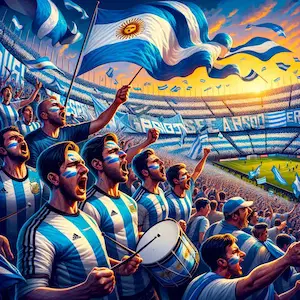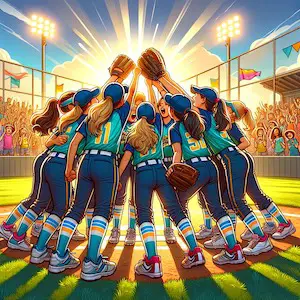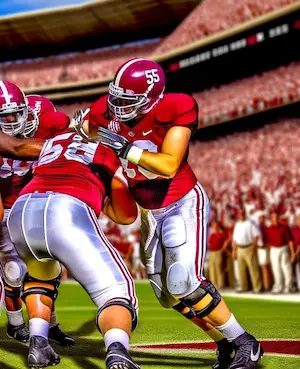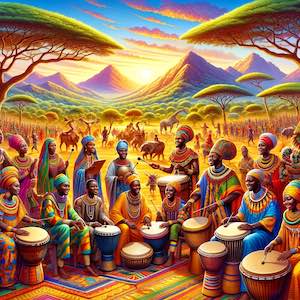In the heart of Argentine culture lies a passionate devotion to football, a sport that transcends the boundaries of mere entertainment to become a way of life. Central to this fervor are the chants that echo through stadiums, streets, and hearts across the country. These chants, more than just background noise, are the soulful expressions of loyalty, joy, despair, and hope that define the Argentine football experience. From the historic rivalries that divide cities to the national pride that unites the country on the world stage, football chants are the common language through which fans communicate their unwavering support and love for the game.
This article delves into the vibrant world of Argentine football chants, exploring their history, types, significance, and the unmatched match-day atmosphere they create. Whether you’re a lifelong fan or new to the world of football, understanding these chants offers a glimpse into the passionate heart of Argentine football culture.

Table of Contents
History and Evolution
The roots of Argentine football chants stretch back to the early 20th century, intertwining with the country’s rich football heritage. Initially, the expressions of support were straightforward, often simple claps or shouts that mirrored the global norm of the time. However, as football established itself as a central part of Argentine culture, these expressions evolved into something far more intricate and meaningful.
The transformation of chants over time mirrors the social and political changes within Argentina itself. During the 1950s and 1960s, as the country experienced intense social upheaval, football chants began to incorporate elements of popular folk and rock songs, reflecting not only support for the team but also broader societal concerns and pride. This period marked the beginning of chants as a vehicle for collective expression, where the stadium became a stage for public discourse, sometimes even challenging authority and societal norms.
By the 1970s and 1980s, Argentine football chants had developed a distinct identity, characterized by their complexity and emotional depth. Fans, or ‘hinchas,’ started to use melodies from famous Argentine rock bands, adapting lyrics to celebrate their teams, taunt rivals, or comment on the state of football governance. This era saw the emergence of the ‘cantitos,’ short songs that could quickly spread through the crowds, uniting fans in common cause.
The international success of Argentine football, highlighted by the World Cup victories in 1978 and 1986, brought a new dimension to the chants. They became imbued with national pride and a sense of superiority in the footballing world. The chants celebrated not only the teams and players but also the country’s ability to overcome adversity and shine on the global stage.
In the modern era, the evolution continues with the digital age bringing fans closer together than ever before. Social media and the internet have facilitated the spread of chants, with new songs quickly learned and shared among fanbases. This has led to an innovative period where chants can be created, adapted, and popularized in a matter of days, reflecting the dynamic nature of the sport and its followers.
Today, Argentine football chants are a vibrant tapestry that narrates the nation’s football journey. They are a living history, evolving with each match yet rooted in decades of tradition. From simple cheers to complex musical expressions, these chants encapsulate the passion, creativity, and resilience of Argentine football fans, making the stadium experience one of the most electrifying in the world.
Types of Chants
Argentine football chants, with their rich diversity and depth, can be broadly categorized into two main types: Traditional Chants and Modern and Innovative Chants. Each type plays a unique role in the culture of Argentine football, reflecting the evolving nature of the sport and its fans.
Traditional Chants
Traditional chants form the backbone of Argentine football culture. These chants have been sung for decades, passed down from generation to generation, and hold a special place in the hearts of fans. They often originate from the early days of football in Argentina, embodying the history, triumphs, and sometimes the struggles of the clubs. Traditional chants are characterized by their simplicity and the emotional connection they evoke, serving as timeless anthems that unite fans.
A classic example of a traditional chant is “Dale Dale Dale Rojo,” sung by fans of Independiente, one of Argentina’s most successful clubs. This chant, like many traditional chants, is straightforward yet powerful, focusing on the relentless support for the team. The repetition of “Dale” (Go) serves as a rallying cry, urging the team to push forward and conquer.
Traditional chants are not just about support; they also express the identity and values of the fan base. They often include references to the club’s history, iconic players, and memorable victories, serving as oral histories that celebrate the team’s legacy.
Modern and Innovative Chants
Modern and innovative chants are a reflection of the current zeitgeist, incorporating contemporary music, themes, and often a sense of humor or irony. These chants are more dynamic and can be adapted quickly to respond to recent events, such as a notable victory, a controversial incident, or the emergence of a new footballing hero.
The melodies for these modern chants may be borrowed from popular songs, both Argentine and international, with lyrics cleverly modified to fit the context of football. This makes them highly relatable and easy for younger fans to pick up, ensuring that the tradition of chanting continues to evolve and thrive.
An example of a modern chant is the adaptation of global pop hits, where the original lyrics are replaced with ones that celebrate a team’s achievements or mock their rivals. These chants often go viral, spreading rapidly through social media and becoming instant hits with fans.
Modern chants also serve as a platform for fans to voice their opinions on broader issues affecting football, such as governance, player transfers, and the commercialization of the sport. They reflect the fans’ engagement with the game beyond just the 90 minutes on the pitch, highlighting their role as active participants in the footballing community.
Famous Argentina Football Chants
Focusing on the rich tapestry of Argentine football chants, let’s explore some famous ones. The lyrics of these chants are not just words; they are profound expressions of identity, pride, and sometimes defiance. While direct translations can capture the essence, the cultural and emotional weight they carry might be harder to convey fully. Here are a few notable examples:
1. “Vamos, Vamos, Argentina”
Lyrics:
Vamos, vamos, Argentina,
vamos, vamos a ganar,
que esta banda quilombera,
no te deja, no te deja de alentar.
Translation and Meaning:
Let’s go, let’s go, Argentina,
let’s go, let’s go to win,
because this rowdy crowd,
never stops, never stops cheering you on.
This chant is a rallying cry for the national team, expressing unwavering support and belief in victory. It’s often heard during international competitions, embodying the collective hope and pride of the nation.
2. “Dale Dale BO”
Lyrics:
Dale dale dale Bo,
dale dale dale Bo,
dale dale dale Bo,
dale dale dale Bo.
Translation and Meaning:
Go on, go on, go on Bo,
go on, go on, go on Bo,
go on, go on, go on Bo,
go on, go on, go on Bo.
This simple yet effective chant is used by Boca Juniors fans to motivate their team. The repetition and rhythm create a powerful and unifying atmosphere, encouraging the team to push forward.
3. “Soy de River”
Lyrics:
Soy de River,
vago y atorrante,
yo te sigo a vos a todas partes,
a la Boca la vamo’ a prender fuego,
y esta noche a River, lo cojemo’.
Translation and Meaning:
I’m from River,
lazy and rogue,
I follow you everywhere,
we’re going to set fire to La Boca,
and tonight, we’re going to beat River.
This chant from River Plate fans showcases the rivalry with Boca Juniors, particularly referencing the Superclásico. It highlights the dedication of the fans, despite the rough and ready nature it portrays.
4. “El que no salta es un inglés”
Lyrics:
El que no salta es un inglés,
el que no salta es un inglés.
Translation and Meaning:
Whoever doesn’t jump is an Englishman,
whoever doesn’t jump is an Englishman.
Originating from the Falklands War, this chant is used by Argentine fans to distinguish themselves from English fans, especially during matches involving England. Jumping to the chant symbolizes solidarity and national pride.
5. “Muchachos, ahora nos volvimos a ilusionar”
Lyrics:
Muchachos,
ahora nos volvimos a ilusionar,
quiero ganar la Copa,
para que lloren todos los de Boca,
Millonario, mi buen amigo,
esta campaña volveremo’ a estar contigo.
Translation and Meaning:
Guys,
now we’ve gotten our hopes up again,
I want to win the Cup,
so that all those from Boca will cry,
Millionaire, my good friend,
this campaign we’ll be with you again.
A chant from River Plate fans, it expresses the renewed hope and desire to win, particularly emphasizing the rivalry with Boca Juniors. It’s a call for unity and support for the team throughout the season.
Argentina Football Chants by Event
Argentine football chants vary widely, capturing the essence of the sport’s passion and the country’s vibrant culture. Here’s a list of some notable Argentine football chants categorized by major football occasions, reflecting the diversity and depth of fan expressions across different contexts:
World Cup and International Competitions
- “Vamos, Vamos, Argentina”
- Occasion: General support for the national team.
- Meaning: A rallying cry for the Argentine national team, expressing support and the desire for victory in international competitions.
- “Brasil, Decime Qué Se Siente”
- Occasion: Matches against Brazil or in Brazil, particularly the 2014 World Cup.
- Meaning: A chant taunting Brazil about Argentina’s historical World Cup victory in 1986, highlighting the intense rivalry between the two nations.
Superclásico (Boca Juniors vs. River Plate)
- “River, Decime Qué Se Siente”
- Occasion: Boca Juniors fans taunting River Plate.
- Meaning: Similar in tone to “Brasil, Decime Qué Se Siente,” this chant taunts River Plate about Boca Juniors’ international successes and River’s relegation to the second division in 2011.
- “Soy de River”
- Occasion: River Plate expressing their identity and rivalry with Boca Juniors.
- Meaning: A chant that embodies the pride of being a River Plate fan and the anticipation of defeating Boca Juniors.
Club Competitions (Libertadores, Sudamericana, Local Leagues)
- “Dale Dale BO” (Boca Juniors)
- Occasion: General support for Boca Juniors in domestic and continental competitions.
- Meaning: A straightforward chant encouraging Boca Juniors to push forward and secure victory.
- “El Más Grande Sigue Siendo River Plate”
- Occasion: River Plate fans asserting their club’s greatness.
- Meaning: A declaration of River Plate’s status as the “greatest” team, often sung to assert dominance in the face of rivals.
Relegation and Promotion Battles
- “Te Alentaré Hasta la Muerte”
- Occasion: Teams fighting against relegation or striving for promotion.
- Meaning: A pledge of unwavering support from fans to their team, regardless of the team’s standing or performance.
Derby Matches (Other than Superclásico)
- “Es Para Vos”
- Occasion: Local derby matches, taunting rivals.
- Meaning: A chant directed at rival teams, implying that the loss or poor performance is particularly for them, often exacerbating local rivalries.
Player Tributes
- “Ole, Ole, Ole, [Player’s Name]”
- Occasion: Celebrating specific players for their contributions.
- Meaning: A universal chant adapted to honor and show appreciation for individual players, recognizing their impact on the game or specific achievements.
These chants are symbolic of the various emotions that football evokes among fans. From the highest highs of international glory to the intense rivalries of local derbies and the deeply personal connections fans have with their clubs and players, Argentine football chants capture it all. Each chant not only serves as a means of support but also as a cultural artifact, telling the story of the game and its people in Argentina.
Argetina Football League Chants
Argentine football is renowned for its passionate fans and the intense rivalries between clubs. Chants against rivals are a significant part of the match-day experience, often filled with wit, humor, and sometimes provocation. Here’s a list of some notable Argentine football chants directed at rival teams:
Boca Juniors vs. River Plate (Superclásico Rivalry)
- “River, Decime Qué Se Siente” (Boca Juniors to River Plate)
- Meaning: A chant mocking River Plate for their relegation to the second division in 2011, set to the tune of “Bad Moon Rising.” It asks River how it feels to have Boca as their “daddy,” referencing Boca’s successes over them.
- “Soy de River, Vago y Atorrante” (River Plate to Boca Juniors)
- Meaning: River fans declare their loyalty and mock Boca by stating they follow River everywhere, even planning to set La Bombonera (Boca’s stadium) on fire.
Independiente vs. Racing Club (Avellaneda Derby)
- “Sos Cagón, Racing Cagón” (Independiente to Racing)
- Meaning: Independiente fans accuse Racing of being cowards, highlighting their perceived lack of courage in matches between the two sides.
- “Independiente, el Gran Campeón” (Racing to Independiente)
- Meaning: Racing fans sarcastically use this chant to mock Independiente’s claim of being the greatest team, despite recent struggles.
San Lorenzo vs. Huracán (Clásico Porteño)
- “Huracán, Huracán, Comparsa de Carnaval” (San Lorenzo to Huracán)
- Meaning: San Lorenzo fans mock Huracán, likening them to a carnival troupe, suggesting they are more show than substance.
- “A San Lorenzo le Tengo Asco” (Huracán to San Lorenzo)
- Meaning: Huracán supporters express their disdain for San Lorenzo, emphasizing the deep-seated animosity between the two clubs.
Rosario Central vs. Newell’s Old Boys (Rosario Derby)
- “El que no salta, abandonó” (Rosario Central to Newell’s)
- Meaning: Central fans accuse Newell’s of leaving a match early or giving up, implying cowardice or lack of commitment.
- “Central, Cagón” (Newell’s Old Boys to Rosario Central)
- Meaning: Newell’s fans return the favor by calling Central cowards, a common theme in Argentine football rivalries.
General Chants Against Rivals
- “El que no salta, se va a la B”
- Meaning: A chant used by fans of any team against a rival who is facing relegation. It suggests that not jumping (participating in the chant) is synonymous with being relegated.
- “Sos de la B”
- Meaning: Directed at teams who have been relegated to the B Division, reminding them of their stint outside the top flight.
These chants showcase the creativity and fervor of Argentine football fans, where the rivalry extends beyond the pitch into songs and chants that resonate through the stands. They reflect the cultural significance of football in Argentina, where the sport is much more than a game; it’s a way of life.
The Role of Chants in Argentine Football
In Argentine football, chants are not just background noise; they are the heartbeat of the game, an essential part of the match-day experience that transcends the action on the pitch. These chants, or “cantos,” as they are locally known, serve several vital roles in the fabric of Argentine football culture, from uniting fans to influencing the outcome of games.
Unity and Identity
One of the primary roles of chants in Argentine football is to foster a sense of unity and identity among fans. In a country where football is deeply ingrained in the cultural psyche, chants become a powerful medium through which supporters express their collective identity. Whether it’s the chants of “Vamos, Vamos, Argentina” that echo through the stands during a national team match or club-specific anthems sung with fervor, these songs bring fans together, creating a unified front that stands behind their team.
Chants also serve as a marker of identity, distinguishing one fanbase from another. Each club has its unique set of chants that reflect its history, values, and traditions. For fans, singing these chants is a way of affirming their allegiance to their club, an act that is as much about celebrating their own identity as it is about supporting their team.
Emotional Connection and Support
Chants are a conduit for the emotional energy of fans, allowing them to actively participate in the game and support their team. Through singing, fans convey their passion, joy, frustration, and hope, creating an emotional bond between themselves and the players on the field. This connection is palpable, with players often citing the motivation they draw from hearing their fans sing, especially in critical moments of the game.
Influence on the Game
The impact of chants extends beyond the emotional, potentially influencing the outcome of matches. The atmosphere in Argentine stadiums, charged with the energy of chanting fans, can be intimidating for visiting teams, giving the home side a psychological advantage. The relentless support can also lift the spirits of the home team, pushing them to perform better. In tight matches, this home advantage, fueled by the power of chants, can be the difference between a draw and a win.
Social Commentary
Football chants in Argentina also serve as a platform for social commentary. Fans use chants to express their views on various issues, from the performance of their team and the decisions of the club management to broader social and political concerns. This aspect of chanting underscores the role of football as a social institution in Argentina, where the sport is intertwined with the fabric of society.
Legacy and Tradition
Finally, chants are a way of honoring the legacy and tradition of clubs and the sport itself. Many chants have been passed down through generations of fans, serving as a link between the past and the present. Singing these chants is a way of paying homage to the legends of the club, celebrating historic victories, and remembering significant moments that have defined the club’s identity over the years.
In conclusion, the role of chants in Argentine football cannot be overstated. They are a vital part of the game, reflecting the passion, unity, and cultural significance of football in Argentina. Through chants, fans not only support their team but also celebrate their identity, connect emotionally with the game, and engage with their community. The power of these chants lies not just in their words or melodies but in their ability to bring people together, creating a shared experience that resonates far beyond the football pitch.
The Experience of a Match Day
In Argentina, a football match day is an immersive experience that begins well before the kickoff and continues long after the final whistle. It’s a cultural event that encompasses not just the game itself but a series of rituals and traditions that define the essence of Argentine football. Central to this experience are the chants, which serve as the heartbeat of the stadium, pulsating with the emotions of thousands of fans.
Before the Match
The match day experience starts early, as fans don their team’s colors and gather in local neighborhoods, bars, or at pre-match events. The air is thick with anticipation, and the chants begin here, serving as a prelude to what will unfold at the stadium. These gatherings are where fans unite, sharing stories of past glories and defeats, all the while singing in unison. The journey to the stadium is often a spectacle in itself, with processions of fans marching through the streets, singing and chanting, turning the city into a sea of their team’s colors.
During the Match
Once inside the stadium, the chants reach a crescendo. Each corner of the arena is alive with songs that have been passed down through generations, as well as new chants created to reflect the current team’s journey. The chants are relentless, not just a response to the action on the field but a constant, driving force that seeks to will the team to victory.
The interaction between the fans in the stands and the players on the pitch is symbiotic; players draw motivation and strength from the unwavering support, while fans feed off the energy of the game. Chants evolve in real-time, reacting to the flow of the match. Goals are met with explosive celebrations, while setbacks see fans rally with chants of encouragement. Rival fans engage in a battle of their own, trading chants across the stadium in a display of competitive spirit and pride.
After the Match
The end of the match does not signal the end of the chanting. Win, lose, or draw, the fans continue to sing. Victories are celebrated with songs of triumph that resonate throughout the neighborhood, turning the streets into impromptu parties. Defeats, on the other hand, are met with defiant chants, reaffirming support for the team in the face of adversity. These post-match moments are a testament to the unwavering loyalty of Argentine football fans, for whom support is not conditional on success.
The chants that fill the match day are more than just songs; they are expressions of identity, community, and passion. They encapsulate the hopes, dreams, and sometimes the frustrations of the fans. The experience of a match day in Argentina, with its rich tapestry of chants, is a vivid illustration of football’s place in the heart of Argentine culture. It’s an experience where the game itself is just one part of a larger, communal celebration of football.
FAQ
Can I participate in chanting if I don’t speak Spanish?
Yes, you can participate in chanting even if you don’t speak Spanish. The rhythm and melody of the chants make it possible to join in the communal experience, and learning a few key phrases or chants in advance can enhance your participation and enjoyment of the match day.
See Related Posts

Gregorian Christmas Chants

Love Spell Chants

Best Softball Chants for U12

AKA Sorority Chants

Argentina Football Chants

Short Chants and Cheers

Alabama Football Chants

Everything to Know About African Chants

